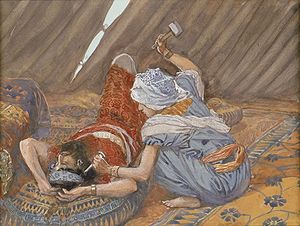Recap
So far, we’ve seen courage exhibited as the nerve to step forward, or the determination to go back. Each decision was fraught with its own unique “what-if”—what if Naaman was outraged at the thought of consulting the spokesman for the God of Israel, and took it out on the little maid? She would be defenseless. Or, what if Naomi met hostility and harsh judgment for having gone to Moab in the first place, much less for staying on indefinitely? Then what would she do?
Both embarked on a course of action, willing to meet the resulting consequences—unintended or otherwise. Their stories ended on a positive note.
In other words
I thought it might be interesting to explore more characteristics of courage as manifested in the lives of several other women from the Book. The broad definition of courage appears simple and concise, i.e., boldness or braveness, but its nuances reveal many fascinating, complex facets.
For this post, we will consider a list of its synonyms, and then revisit some Bible accounts of this attribute at work in its various forms.
First the synonyms…
adventurousness
audacity
backbone
bravery
courageousness
daring
dash
dauntlessness
endurance
fearlessness
gallantry
gameness
gutsiness
grit
heart
heroism
intestinal fortitude
intrepidity
nerve
pluck
prowess
rashness
spirit
spunk
stoutness
tenacity
valor
virtue
Meet the women: courage at work

English: Jael Smote Sisera, and Slew Him, circa 1896-1902, by James Jacques Joseph Tissot (French, 1836-1902) or follower, gouache on board, 5 7/16 x 7 3/8 in. (13.9 x 18.8 cm), at the Jewish Museum, New York (Photo credit: Wikipedia)
- Jael (Judges 4:17-23): the Kenite woman who killed Sisera, Israel’s formidable enemy during the time of Deborah. Jael witnessed a man running towards her from some unseen threat. She recognized him as Sisera, and instantly knew his problem: Barak and ten thousand of his men were in hot pursuit. Always resourceful, she invited him into her tent, implying sanctuary. With customary hospitality, she gave him a drink of fermented milk, lulling him into a false sense of security and eventually, sleep. Jael, with quiet deliberation, picked up a hammer and proceeded to drive a tent peg through his temple, thus fulfilling Deborah’s prophecy: “…for the Lord shall sell Sisera into the hand of a woman” (vs. 9).
- Jehosheba (2 Kings 11:2; 2 Chron. 22:11): the half-sister of King Ahaziah who saved her nephew from assassination. After Ahaziah died in battle, his mother, Athaliah, attempted to kill all her grandsons while usurping the throne. Spurred by the horror of impending disaster, Jehosheba rescued Ahaziah’s youngest son, the infant Joash. With the help of her husband, the righteous priest Jehoiadah, she hid the boy in the Temple for six years until he was old enough to be proclaimed the rightful king. Jehosheba’s act preserved “the house and lineage of David” (Luke 2:4), from which Jesus was descended.
- Jochebed (Ex. 2:1-4): the mother of Moses who devised a plan to save him from the Pharaoh’s death decree targeting all Hebrew baby boys. After three months, she knew she could no longer safely hide Moses herself. So she secreted her infant among the reeds along the riverbank, and stationed his older sister Miriam to stand vigil. Jochebed’s valiant efforts to spare her child succeeded, and she possibly lived to see Moses become the revered leader and liberator of the people of Israel.
- Michal (1 Sam. 19:10-17): king Saul’s younger daughter, and David’s wife. Michal learned of her father’s demented intention to kill her husband, and her only thought was to save her beloved. She helped David escape through a window, and used her quick-thinking to devise a plan. Through subterfuge, she deceived her father (a risky activity given Saul’s often unstable state of mind), and assured her husband’s getaway.
- Rahab (Joshua 2:1-6): the harlot who secretly housed two men sent by Joshua to scout out Jericho, and helped them avoid apprehension. First, she hid them in stalks of flax on her roof; and then, after sending the king’s messengers on a false trail, Rahab let the spies down the outside wall by a rope through the window of her house.
- Tamar (Gen. 38:6-30): the widow of Er, the wicked firstborn son of Judah who was slain by the Lord. According to the law of levirate marriage, Judah’s second son, Onan, should have married Tamar. Their first child would have been regarded as his brother’s, and carried on his name. However, Onan refused to comply, and Judah encouraged Tamar to wait for his third son, Shuah, to reach maturity. Time passed. Shuah grew to manhood, but no marriage union was forthcoming. Undaunted, Tamar devised a plan. She tricked Judah himself into having sex with her in order to produce offspring, and secure her family’s rights of inheritance as part of Judah’s posterity.
- Servant girl of En-rogel (2 Sam. 17:17): the girl who carried military intelligence obtained by Hushai, David’s spy, when Absalom’s revolt forced David to flee Jerusalem. It is possible that females of her status (she may have worked in the temple complex or for a wealthy loyalist) had freedom of movement in and out of Jerusalem, thereby allowing her to go unnoticed as she went about her covert activities.

